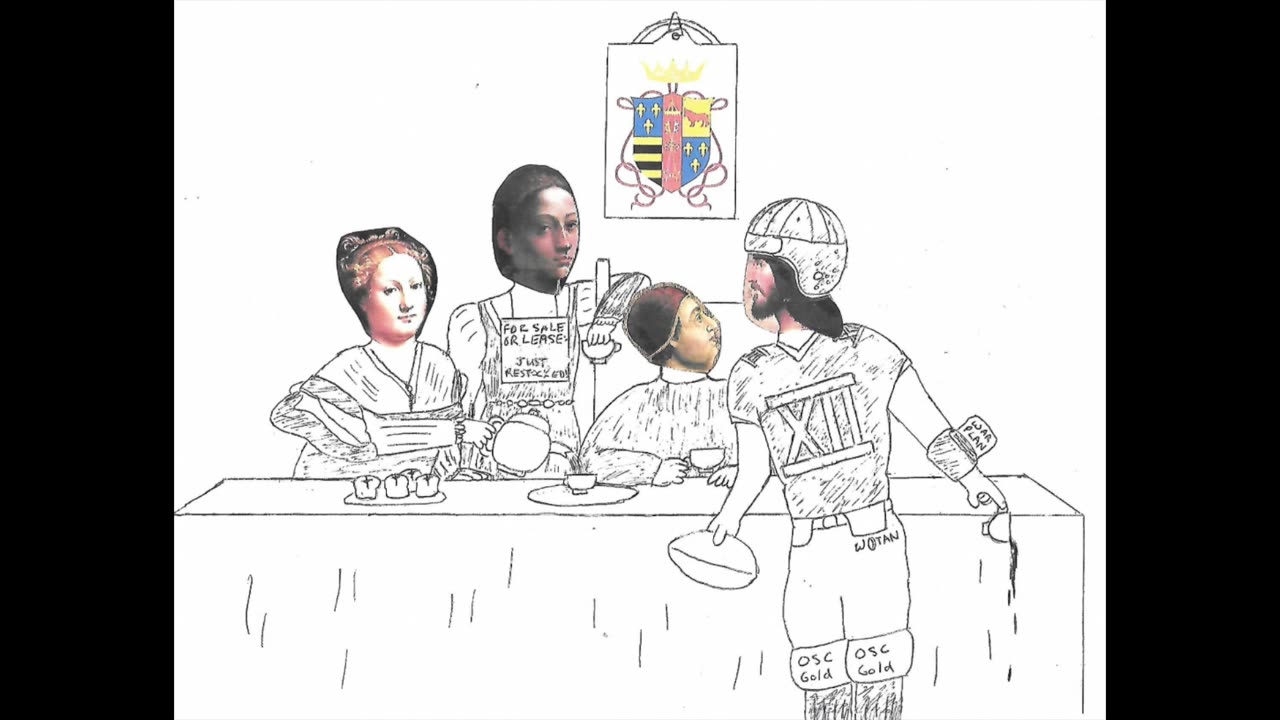Premium Only Content

Arsenic and Old Prince
This sketch was inspired by John Collier’s painting “A Glass of Wine with Caesar [sic] Borgia” (1893). The portrait depicts Cesare Borgia, Cesare’s sister, Lucrezia Borgia, their father, Pope Alexander VI (born Rodrigo de Borja), and an unidentified young man holding an empty glass. The painting is supposed to represent the popular notion of the treacherous nature of the Borgias; that is to say, that the young man cannot be sure that the wine he takes isn't poisoned. After conducting some research on the Borgia (or Borja) family, we here at CoBaD found that while treachery may be par for the course with Alexander VI, and to a certain extent his son, Cesare, the same cannot be said for Lucrezia. Lucrezia seemed to have been a pawn to her father’s ambitions to seal pacts with powerful families through arranged marriages. Yet despite this, the painter John Collier (1850-1934) appears to be just like Julius II and the Medici family; that is, perfectly content with painting Lucrezia with the same broad brush as Alexander VI and Cesare. But instead of gaining power from the perpetuation of a myth like Julius II and the Medici family did, Mr. Collier’s gains were merely self-centered in nature; furthering his career with the scoring of exhibitions and getting a platform to sell his slutty artwork of nude ladies posing with, beside and on top of animals. Exploiting women one way or another. Other than that, though, Mr. Collier seemed to be a rather splendid chap, except for that bit about his wife dying in 1885 and then two years later turning around and marrying his dead wife's sister. Weirdo.
Vannozza: “In any case, I don’t you want you touching the tea. I’ve heard about your wild arsenic and old face parties with those weird Brewster sisters up in Brooklyn.” – A reference to the classic 1944 movie, “Arsenic and Old Lace,” based on the Joseph Kesselring 1941 play of the same name.
Lucrezia: ”A frame-up too. Not just any old frame up, mind you. It was one of that them there matching Moroccan Antique Gold look frame-ups that are all the rage that look amazing on my bathroom wall.”
Vannozza: “Knock off the reach back, my Daughter.”
Lucrezia: “Sorry.”
For more on the "Moroccan Antique Gold look frames," see the “I’m Gonna Rearrange Your Face” sketch.
Lucrezia: “…John was just pissed because I wouldn’t take my clothes off in his zoo. ‘The Ass Menagerie.’ What a stupid comic strip.” – John Collier painted at least three women who showed their asses with animals: “Circe” (1885, with a tiger and an ocelot), “Lilith” (1887, with a snake), and “Lady Godiva” (1898, on horseback).
Lucrezia: “He’ll be the ruin of the Borgia family. If not him then it’ll be that brother of mine.”
Vannozza: “Now, don’t be so hard on Victor. There’s a genuine market in Italy for those that can play the overture to ‘The William Tell Overture’ upside down.” - A reference to Victor Borge (1909-2000), the comedy pianist.
Cesare: “No, you’re pulling my leg. This is an eminence front; it’s a put on. - Reference to a line from the song “Eminence Front” by The Who.
Lucrezia: “I even knitted you a comic relief sidekick for your journey. Machiavelli is his name. I hope you like him. He comes with a matching souvenir shirt he bought at a whorehouse. “ - On page 58-60 of “The Portable Machiavelli,” (ed. by Peter Bondanella and Mark Musa, 1979), there appears a very explicit private letter written by Niccolò Machiavelli to his friend, Luigi Guicciardini of Mantua on 9 December 1509. In the letter, Machiavelli (who incidentally was married at the time) describes to his friend that he was approached by an old lady asking him if he could come inside her house and see some shirts she just made. Machiavelli followed her inside, where he saw another old lady who showed her the shirts. Once the first old lady left, Machiavelli then proceeded to have sex with the second old lady, who was allegedly a prostitute. The editors seem to think this story is at least partially true. Another weirdo.
Cesare: “Not to mention the animated series based on the movie based on your book about the cured lepers, ‘A Farewell to Alms,’ you know, the one adapted for skit by Monty Python’s ‘Life of Brian…” - Referring to the “Alms for an ex-leper” skit in “Life of Brian.”
Cesare: “…and the musical based on the animated series based on the movie based on your book about Jesus’s days as a vinedresser, 'The Grapes of Wrath, Sloth, Envy, Pride, Greed, Gluttony and Lust.'” – "Cannibalize Productions" is a spoof of Disney, an entertainment and mass media conglomerate that likes to recycle its material. Disney is kind of like a dictatorship under international sanctions that has to keep its aircraft in the air by cannibalizing parts from its grounded aircraft.
Cesare: “And what about your reality TV show? You know, the next episode of ‘Husband for a Day,’ where you betroth a girl to a prominent noblemen whose convenient alliance you desperately need in order to gain political stability?
Lucrezia: “Another arranged marriage?! Pop, for crying out loud, I’ve had four already!”
Alexander VI: “Stop exaggerating, my Daughter. You’ve only had one. I had the first three annulled.”
Actually, they’re both right. In February, 1491, when Lucrezia was only 11 years old, her father (then Cardinal) drew up a matrimonial arrangement between Lucrezia and the Lord of Val D'Ayora. Two months later, her father annulled that arrangement and drew up a contract with Don Gaspare Aversa, Count of Procida. After becoming pope in August, 1492, Lucrezia’s father annulled that matrimonial contract and in 1493 arranged for Lucrezia to marry Giovanni Sforza, a member of the powerful House of Sforza. Lucrezia would go on to marry Giovanni in June of that year. In December, 1497, Alexander VI had Lucrezia’s marriage annulled, and in 1498, betrothed her to Alfonso of Aragon, an influential family in Naples. Lucrezia and Don Alfonso were married in July, 1498. So as of the time of this sketch, the 18-year old Lucrezia had been through four arranged marriages, three of which were wedding.
Lucrezia and Don Alfonso, however, did not stay married long. In 1499, Lucretia's pop the pope sought to align himself with France. The following year, in July, 1500, Don Alfonso was stabbed outside St. Peter’s Basilica in Rome. Don Alphonso survived the attack, and was being nursed back to health, when thirty-three days later, he was found strangled in his bed. In 1502, Alexander VI married Lucrezia off yet again, this time to the Alfonso I d'Este, Duke of Ferrara. She, in true weirdo John Collier fashion, had a taste for in-laws, and had a long and torrid affair with her husband's brother, Francesco Il Gonzaga, Marquess of Mantua.
Don Alfonso’s murder officially remains a mystery, but it wouldn’t be too much of a stretch to suspect it as one of the shenanigans of our favorite matchmaker, Alexander VI.
Alexander VI: “Here are the keys…” – the “keychain” was Cesare Borgia’s coat of arms as Duke of Valentinois, Duke of Romagna and Captain-General of the Church.
Cesare: “Very well. If it is my Sforza del destino, then so be it.” - A reference to Verdi’s opera “Forza del destino” by Giuseppe Verdi. We here at CoBaD have never seen the opera. Based on a summary of the plot, we don’t think we want to either. Rather depressing, even for an opera.
Vannozza: “I packed you some fresh mercenaries for occupying the city, my Son. They’ll go nicely with your sidekick.”
Lucrezia: “Yeah, Machiavelli said to knock on Cate’s door and shout ‘Little Pig, Little Pig, let me come in.’ If she refuses to grant you entry by the hair of her chinny chin chin, then you’re under strict orders to huff and puff and blow her house down. He said Mom’s mercenaries, backed by Uncle Lou’s 300 cavalry, 4,000 infantry and heavy artillery should do the trick.”
Refers to the following passage in “The Prince”:
“…[W]hen those states that are acquired are used to living by their own laws and in freedom, there are three methods of holding on to them: the first is to destroy them; the second is to go there in person to live; the third is to is to allow them to live with their own laws, forcing them to pay a tribute and creating therein a government made up of only a few people who will keep the state friendly toward you…But in republics there is greater vitality, greater hatred, greater desire for revenge; the memory of ancient liberty does not and cannot allow them to rest, so that the most secure way is either to destroy them or to go there to live.”
(Chapter V, “How Cities or Principalities Should Be Governed That Lived By Their Own Laws Before They Were Occupied.”)
In the fable “The Three Little Pigs,” the Big Bad Wolf went to the house of the Three Little Pigs to live (“Little pigs, little pigs, let me come in”). When the pigs refused to pay him a tribute by welcoming him into their humble abode (“not by the hair of my chinny, chin chin”), the Big Bad Wolf destroyed the house (“Then I’ll huff and I’ll puff and I’ll blow your house down”). So the Big Bad Wolf was a little bit of a Prince himself.
Cesare: “Buff, gruff, rough, tough, huff, puff, muff, cuff and stuff. Got it. Thanks, lowercase sis.” – With his newly buffed command post, Cesare, in a gruff manner, was to take his father’s rough army and his mother’s tough mercenaries and proceed to huff and puff and clumsily muff Caterina’s castle down. Cesare then was to (hand)cuff the Countess and stuff her in prison (Castel Sant'Angelo). Memory aids are wonderful things.
Alexander VI: “When you get to Castel Sant'Angelo, give my regards to Tosca; that is, of course, assuming she hasn’t thrown herself off the top of the parapet yet.” - Castel Sant'Angelo is the setting for Act III of Giacomo Puccini’s “Tosca.”
Lucrezia: “Care for some of my Napoleon cantarella jelly, The Holy Father? It’s made with fresh elderberries.”
Napoleon the Pig in George Orwell’s “Animal Farm” was modeled after Stalin. As alluded to in “The Hams Justifies the Means” sketch, Stalin is widely regarded as a Machiavellian Prince because Stalin, like Julius II and Alexander VI, exercised four key qualities: always think of war, be miserly rather than generous, be feared but not hated, and choose a side in a war and never be neutral. Stalin indeed, was a fan of Machiavelli; Stalin himself possessed an annotated copy of “The Prince.”
Pope Alexander VI was rumored to have been poisoned with cantarella (a compound of putrefied pig entrails and arsenic). The poison was believed to have been used extensively by the Borgia family. The condition of his body seems to have supported death by poisoning theory, although Alexander VI’s official cause of death is listed as malaria.
Closing titles - Notice in the closing credits that the last names for Rodrigo and Vannozza are spelled “Borja,” not Borgia. The Borjas/Borgias are in fact a Spanish family, not Italian. They take their name from the town of Borja, in Zaragoza in Spain. As stated above, Alexander VI’s birth name is spelled Borja. It was his children Cesare and Lucrezia that took on the alternative spelling of Borgia. Crazy kids.
"The Prince (disputed)" - In Chapter VII Machiavelli’s "The Prince,” he cites Cesare Borgia as a Prince, although we here at CoBaD dispute that weirdo Machiavelli. Cesare was too reliant on his father’s power as pope, such that, upon his father’s passing, both he (and the Borgia family or that matter) lost their influence in Italy. Cesare clearly had too much luck and not enough skill.
Scrolling caption and voiceover: “You have been watching the spinoff of the reality TV show of the novelization of the feature film of the animated series of the musical of the spinoff Arsenic and Old Prince. Arsenic and Old Prince is a Recycled Production, in collusion with a Pope Julius II and Medici Family Smear Campaign.” – As Lee (2013) argued, while Pope Alexander VI may have engaged in un-pope like behavior (e.g., keeping mistresses, fathering children and amassing armies), many other popes did so as well, such as the aforementioned Julius II (aka, “The Battle Pope”). Similarly, while the Borgias admittedly had their share of misdeeds (e.g., murder and nepotism), the Medici, the Malatesta and the Sforza families all had their “hands in the cookie jar” as well. Thankfully, many of the most wretched debaucheries that the Borgias were saddled with (fratricide, incest, and even Alexander VI’s so-called “Banquet of the Chestnuts”) have been debunked by modern day historians as either made up or grossly exaggerated. As Lee (2013) states, it is perhaps because the Borgias were a Spanish family living in Italy that made them such a target of ridicule, and Italy’s convenient deflection away from its own corruption.
References:
Biography.com. (20 April, 2021). Lucrezia Borgia. https://www.biography.com/crime/lucrezia-borgia
Britannica. Lucrezia Borgia, Italian noble. https://www.britannica.com/biography/Lucrezia-Borgia
Ingliss-Arkell, E. (09 December 2014) What Was in "Cantarella," The Borgia's Famous Poison? Gizmodo.com. https://gizmodo.com/what-was-in-cantarella-the-borgias-famous-poison-1668857273
Lee, A. (01 October 2013). Were the Borgias Really So Bad? Historytoday.com. https://www.historytoday.com/history-matters/were-borgias-really-so-bad
Machiavelli, N. (1979). The Portable Machiavelli. Ed by Peter Bondanella and Mark Musa. Penguin Books. First published in 1532.
Internet Archive Wayback Machine. Web.archive.org. The murder of Alfonso of Aragon. https://web.archive.org/web/20050104073703/http:/books.rakeshv.org/html/lcbga10/lcbga10ch15.html
Mingren, W. (‘Dhwty’). (10 August 2020). Pope Alexander VI: Unscrupulous Borgia Patriarch With a Lust for Power. Ancient-Origins.net. https://www.ancient-origins.net/history-famous-people/pope-alexander-vi-0014104#google_vignette
Vučković, A. (27 December 2021). Lucrezia Borgia: The Misunderstood Femme Fatale of the Renaissance. www.ancient-origins.net. https://www.ancient-origins.net/history-famous-people/lucrezia-borgia-0016228
Wikipedia. Alfonso of Aragon (1481-1500). https://en.wikipedia.org/wiki/Alfonso_of_Aragon_(1481%E2%80%931500)
Wikipedia. Cesare Borgia. https://en.wikipedia.org/wiki/Cesare_Borgia
Wikipedia. John Collier (painter). https://en.wikipedia.org/wiki/John_Collier_(painter)
Wikipedia. La forza del destino. https://en.wikipedia.org/wiki/La_forza_del_destino
Wikipedia. Pope Julius II. https://en.wikipedia.org/wiki/Pope_Julius_II
Wikipedia. Vannozza dei Cattanei. https://en.wikipedia.org/wiki/Vannozza_dei_Cattanei
————-
Convulsions of Birth and Death (CoBaD) is a comedy sketch troupe founded in September, 2022 that posts skits on social media covering varied topics such as music, history, art, science, sports, literature and events encountered in everyday life. The title was inspired by Henry David Thoreau’s “Civil Disobedience” (1849), an essay written as a protest against the U.S. government taking his “gift” (i.e., his taxes), and wasting it in ways in which he did not approve (e.g., war and slavery). CoBaD writes sketches in the spirit of Thoreau, but instead of strictly casting its nets outwards towards governments and figures of authority, it projects its protest inwards by taking a humorous, lightheaded look at humanity and specifically those who take the greatest gift of all, life, and senselessly and stupidly waste it on greed, narcissism, self-centeredness, petty-mindedness, arrogance, opportunism, power-grabbing, quid pro quo, the status quo, ulterior motives, and the most despicable waste of all, social media.
-
 2:08:45
2:08:45
Kim Iversen
6 hours agoNew Year, New PSYOP?: The Fort Bragg Connection In The New Years Terror Attacks
35.4K74 -
 1:41:18
1:41:18
Glenn Greenwald
5 hours agoTerror Attacks Exploited To Push Unrelated Narratives; Facing Imminent Firing Squad, Liz Cheney Awarded Presidential Medal | SYSTEM UPDATE #381
65.2K75 -
 DVR
DVR
Man in America
7 hours ago🔴 LIVE: Terror Attacks or False Flags? IT DOESN'T ADD UP!!!
11.1K1 -
 1:02:38
1:02:38
Donald Trump Jr.
9 hours agoNew Year’s Terror, Latest Breaking News with Sebastian Gorka | TRIGGERED Ep.204
142K290 -
 59:59
59:59
The StoneZONE with Roger Stone
4 hours agoAfter Years of Targeting Trump, FBI and DOJ are Unprepared to Stop Terror Attacks | The StoneZONE
27.5K7 -
 1:26:42
1:26:42
Leonardaisfunny
2 hours ago $1.09 earnedH-1b Visas: Infinity Indians
15.6K17 -
 1:08:33
1:08:33
Josh Pate's College Football Show
7 hours ago $0.40 earnedPlayoff Reaction Special: Ohio State Owns Oregon | Texas Survives | UGA vs Notre Dame Takeaways
18.8K2 -
 58:04
58:04
Kimberly Guilfoyle
7 hours agoFBI's Terror Response Failures, Live with Steve Friend & Kyle Seraphin | Ep. 185
95.3K40 -
 2:15:01
2:15:01
WeAreChange
8 hours agoMassive Developments In Vegas Investigation! UNREAL DETONATION, Shocking Details Emerge!
102K35 -
 54:02
54:02
LFA TV
14 hours ago2025 Is Off to a Violent Start | TRUMPET DAILY 1.2.25 7pm
39.9K7